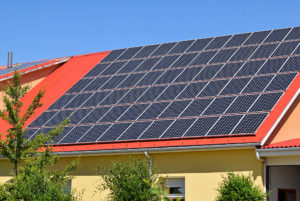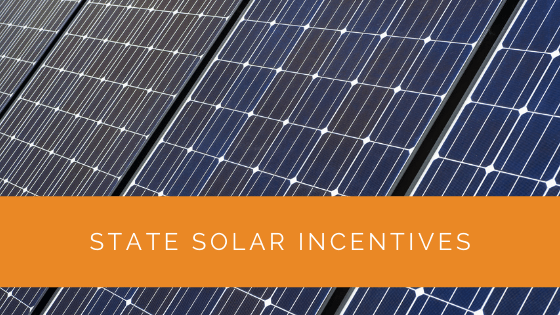The U.S. government is doing a great job of encouraging more and more people to shift to solar as their primary source of energy. Several incentives have been rolled out by the state, both at a national and district level, to facilitate the evolution of solar energy.
The cost of solar panels has indeed declined over the last few years, but it is still a significant investment for house and business owners to lower their electricity bills. To encourage the adoption of solar energy, the US government offers some incentives to make solar energy more viable.
This article will provide you with all the information you need regarding the rebates, tax credits, and other incentives you can avail of by moving to solar renewable energy.
Let’s get started.
Contents
- 1 Key Takeaways
- 2 Federal Solar Tax Credit (FSTC)
- 3 Solar Rebates and Incentives By The State Government
- 4 Some Other Solar Based Incentives
- 5 Case Study: Residential Solar Panel Installation
- 6 Expert Insights From Our Solar Panel Installers About State Solar Incentives
- 7 Experience Solar Excellence with Us!
- 8 Final Words
Key Takeaways
- The U.S. government offers various incentives to encourage the adoption of solar energy, including the Federal Solar Tax Credit (FSTC), which provides a tax credit for solar photovoltaic system installations. The credit amount varies depending on installation dates, with up to 30% available for systems installed between 2022 and 2032.
- Many U.S. states also offer their own solar rebates and incentives, such as tax credits, property tax exemptions, and rebate programs, to further reduce the cost of going solar and promote renewable energy adoption. These state-specific benefits vary and can significantly impact the overall financial benefits of transitioning to solar energy.
Federal Solar Tax Credit (FSTC)
FSTC is one of the state’s most significant incentives to encourage people to install solar photovoltaics. However, to understand the nuances of the Federal Solar Tax Credit. You first need to understand what is a tax credit.
What Is a Tax Credit?
A tax credit is a dollar-to-dollar deduction in the income tax that you are liable to pay. It means that 1 tax credit would exempt you from 1 dollar of income tax. For example, if you have 5,000 tax credits, you’ll have to pay $500 less in your annual income tax.
What is Federal Solar Tax Credit?
The Investment Tax Credit (ITC) for solar power allows taxpayers to claim a credit on their income tax for a portion of the cost of a solar photovoltaic system. This credit is available if the system is installed during the tax year and is used to generate electricity for a residence in the United States.
Under recent updates, the ITC offers a 30% tax credit for systems installed between 2022 and 2032. This is an increase from the previously planned tax credit rates. Starting from 2033, the tax credit will decrease, decreasing to 26% in 2033 and further reducing to 22% in 2034. No maximum limit on the amount can be claimed under this credit.

Eligibility Criteria For Federal Solar Tax Credit
You must fulfill specific parameters to be eligible for the Federal Solar Tax Benefits. These parameters are as follows.
- There is a 30% tax credit for systems installed between 2022 and 2032. This is an increase from the previously planned tax credit rates. Starting from 2033, the tax credit will decrease, decreasing to 26% in 2033 and further reducing to 22% in 2034. No maximum limit on the amount can be claimed under this credit.
- You can avail of this credit only on the original installation of the system.
- You own the solar panel and use the energy generated for your consumption.
- The solar photovoltaic system is installed at your primary or secondary location of residence.
Expenses Included
You need to understand what all of your charges come under the Federal Solar Tax Credit Scheme.
Here is a list of all the expenses that are included.
- Solar power that is used to power the attic fan
- Sales taxes on eligible expenses
- Labor cost for onsite preparation, assembly, or original installation, including permit fee and other charges
- Balance of system equipment, including wiring, inverters, and mounting equipment
- Cost of the energy storage device charged exclusively by the associated solar PV panels
How Does Federal Tax Credit Affect Other Incentives?
FTC can impact the other benefits provided by the State and Central government. To draw a detailed comparison of all the rebates, you can check out the database of state incentives for renewables and efficiency website.
- Rebate From Electric Utility to Install Panel: The subsidies provided for the installation of panels are often excluded from income tax. The utility rebate for installing the solar panel is deducted before calculating your tax credit.
- Payment for Renewable Energy Certificates: If your utility gives you a cash amount in exchange for your renewable energy certificates, that income is considered as taxable income. This means that it will increase your gross income but not reduce your federal tax credits.
- State Tax Credit: State tax credit does not affect federal tax credit and vice versa. However, when you receive state tax benefits, the taxable income that you’ll report for federal tax will be more because you have less state income tax to deduct.
- Rebate from the State Government: This does not decrease your federal tax credits. Your FTC will be calculated in the same manner irrespective of your refund from the state government, provided that the solar PV was installed after 2006.
Solar Rebates and Incentives By The State Government
Several states have exclusive benefits that are only available to the state’s residents. Keep in mind that these benefits are entirely separate from Federal benefits.
Let’s look at some of the benefits offered by different states to help offset the cost of going solar.
Arizona
Arizona has contributed immensely to the solar growth of the country. This has been made possible by some exclusive benefits and rebates offered by the state’s government to people contributing to the solar growth.
Let’s take a look at some of the top-rated solar tax credits and incentives.
- Residential Arizona Solar Tax Credit: This incentive reimburses you 25% of the total cost of your solar panel, up to $1000.
- Equipment and Property Tax Exemptions: This rebate frees you from any additional property tax that you might have to pay because of the addition in your property value after solar panels installation.

California
The state of California offers certain rebates and exemptions that put solar power within reach of the average public. The most prominent rebates are the ones provided by Rancho Mirage Energy Authority (RMEA). If you’re installing solar on a home in Rancho Mirage, RMEA will provide you with a $500 rebate to cover your permit fees.
Please Note: The rebate is provided after the utility company has granted permission to operate within the said premises.
Net Metering is another excellent benefit offered by the state of California. In the golden state, any solar panel owner can receive bill credits for their extra solar power at the retail rate from their utility.
Colorado
The Centennial State offers some of the best solar incentives in the country. Some of the Colorado solar rebates include.
- EnergySmart Colorado: This scheme is redeemable for people planning to install a solar panel in a house in Eagle Valley, Roaring Fork Valley, and Summit County. EnergySmart Colorado provides a rebate of anywhere from $400 to $3000 on solar installations.
- Holy Cross Energy: Holy Cross has a per Kilo-Watt rebate system for its customer to reduce the cost of installing solars. Homeowners installing an average 6KW system can save up to $4,500 on their installments by this scheme.
Connecticut
The nutmeg state is just on top of schemes regarding solar rebates as its contemporary states. Some of the significant renewable energy incentives offered by Connecticut are listed below.
- Solar Rebate Programs: This rebate is worth $0.46 per Watt of solar installed up to 10 KW. This rebate means that a homeowner who invests in a 5KW system would receive $2,315 as refund.
- Energy Conservation Loan Program: The state of Connecticut offers a deferred interest rate for your loan for the system. Eligible families can borrow up to $25,000 for 10 years at interest rates as low as 0 to 6%.
- Tax Exemptions For Renewable Energy Equipments: Thanks to some CT tax leverage for solar, you don’t need to pay any taxes on installing your solar panels. The Sales and Use Tax Exemption for Solar and Geothermal System frees you from any tax on purchasing your system. Moreover, the Property Tax Exemption for Renewable Energy Systems saves you from paying any additional taxes on the raised value of your home.
New York
The hustling-bustling state of New York is making every possible effort to reduce its carbon footprint. From rebates on installation systems to a reduction in taxes, New York has everything covered.
- The Megawatt Block Incentive Structure: This is a direct incentive available under New York’s forward-looking NY-Sun Initiative. The incentive provides an upfront rebate for commercial and residential solar energy uses. The amount of subsidy depends on how much solar energy is being produced and can be as high as $1/W.
- New York Net Metering: This is a crucial policy that aims to make sure that you get the right price for pumping solar energy into the grid. Any excess credit accrued is credited in your ‘credit bank’ and can be used in future months.
- New York State Solar Tax Credit: This credit scheme can reduce your state tax payment by 25% of your total solar energy expense. You could avail this scheme even if you leased out your solar panel system. Moreover, you can enroll in the credit scheme next year if your tax liability isn’t large enough to claim the full benefit currently.
These were some of the leading and unique solar incentives some of the states offer. Other states also provide similar exclusive benefits to their residents to boost solar energy usage. You can check out the subsidy programs of other states from their respective state websites.

Some Other Solar Based Incentives
The previous section introduced you to the major Federal Tax Credit and other exclusive benefits different states offer. However, the U.S. government provides several other solar incentives to its citizens. A few of them have been listed below.
Solar Incentive for Businesses
These schemes usually entail accelerated and bonus depreciation. If you are a business owner looking to install solar, this can be the ideal scheme. It helps in reducing businesses’ tax burden by offering them accelerated depreciation through Modified Accelerated Tax Recovery System.
Qualified solar energy equipment is eligible for a cost recovery period of 5 years. Net system costs can be reduced by 30% through accelerated depreciation.
Subsidized Loans
State, non-government organizations, or several utility companies offer subsidized solar loans with reduced interest rates. Keep in mind that these loans are usually available only for a limited period.
Case Study: Residential Solar Panel Installation
Background
In the heart of Missouri, the Foster family, consisting of two adults and three children, was experiencing escalating electricity bills. Motivated by the rising costs and a desire to contribute to environmental sustainability, they decided to explore solar energy. After extensive research, they chose Solar Panels Network USA to handle their residential solar installation.
Project Overview
Our initial assessment revealed that the Foster family consumed approximately 18,000 kWh of electricity annually. To cover their energy needs and take advantage of Missouri’s solar incentives, we recommended an 11 kW solar panel system. This system was designed to maximize their energy production and savings, leveraging state and federal incentives to reduce the overall cost.
Implementation
The installation process was meticulous and designed to minimize disruption to the Foster family’s daily life. Key steps included:
- Site Assessment and Design: We conducted a detailed site survey to determine the optimal placement for the solar panels, considering roof orientation and potential shading. The system design included high-efficiency monocrystalline panels and a smart inverter to ensure maximum energy conversion.
- Permitting and Approvals: We handled all necessary permits and approvals from local authorities and the utility company, ensuring compliance with Missouri’s regulations and smooth integration with the grid.
- Installation: Our expert team installed the panels over three days. The installation was seamless, with panels mounted on the south-facing roof to maximize sun exposure.
- Training and Handover: Post-installation, we provided the Foster family with comprehensive training on the system’s operation and maintenance, ensuring they felt confident managing their new solar setup.
Results
The Foster family’s new solar panel system began producing energy immediately upon installation, yielding impressive results:
- Initial Investment: $28,000
- Federal Tax Credit (30%): $8,400
- State Incentives and Rebates: $3,500
- Net Metering Savings (First Year): $1,800
- Annual Electricity Savings: $2,500
After accounting for the federal tax credit and state incentives, the effective initial investment was reduced to $16,100. With annual savings of $4,300 (including net metering credits), the projected payback period for the system was just under 4 years.
Summary
This residential solar installation in Missouri showcases the substantial financial and environmental benefits of adopting solar energy. The Foster family saw immediate reductions in their electricity bills and contributed to a greener future. Over the 25-year lifespan of the system, they are projected to save over $107,500 in electricity costs, significantly enhancing their home’s value and sustainability.
At Solar Panels Network USA, we pride ourselves on delivering tailored solar solutions that maximize both savings and sustainability. This project highlights the transformative potential of solar energy for residential customers, demonstrating that state solar incentives can make a significant difference in the affordability and feasibility of solar installations.
Expert Insights From Our Solar Panel Installers About State Solar Incentives
State solar incentives are a game-changer for homeowners considering solar panel installations. In Missouri, we’ve seen significant savings from rebates and tax credits that make solar energy more accessible and financially viable.
Lead Installer
Navigating the maze of state incentives can be daunting, but the benefits are substantial. Missouri offers various incentives that, when combined with federal tax credits, can reduce the upfront cost of solar installations by up to 50%.
Senior Solar Technician
Designing a solar system tailored to a homeowner’s needs includes integrating state incentives into the financial planning. Missouri’s robust incentive programs help in creating cost-effective and efficient solar solutions.
Solar System Designer
Experience Solar Excellence with Us!
Trust in Solar Panels Network USA, where our seasoned experts deliver top-quality solar solutions for homes and businesses nationwide. With a legacy of countless successful installations and a commitment to sustainable energy, we’re your reliable partner in the solar journey. Ready for a brighter, eco-friendly future? Call us now at (855) 427-0058 and harness the power of the sun!
Final Words
Efforts are being all around the world to reduce humankind’s carbon footprint. The United States has been a torchbearer in encouraging people to shift to a more renewable form of energy in the form of solar energy.
In the last decade, solar energy has witnessed an increase in its consumption in the United States. With promoting schemes and heavy subsidies, America is well on its way to greater sustainable development.
Get the quote for your own solar panel installation today.
About the Author
Solar Panels Network USA stands at the forefront of solar energy solutions, driven by a team of seasoned solar engineers and energy consultants. With over decades of experience in delivering high-quality solar installations and maintenance, we are committed to promoting sustainable energy through customer-centric, tailored solutions. Our articles reflect this commitment, crafted collaboratively by experts to provide accurate, up-to-date insights into solar technology, ensuring our readers are well-informed and empowered in their solar energy decisions.


